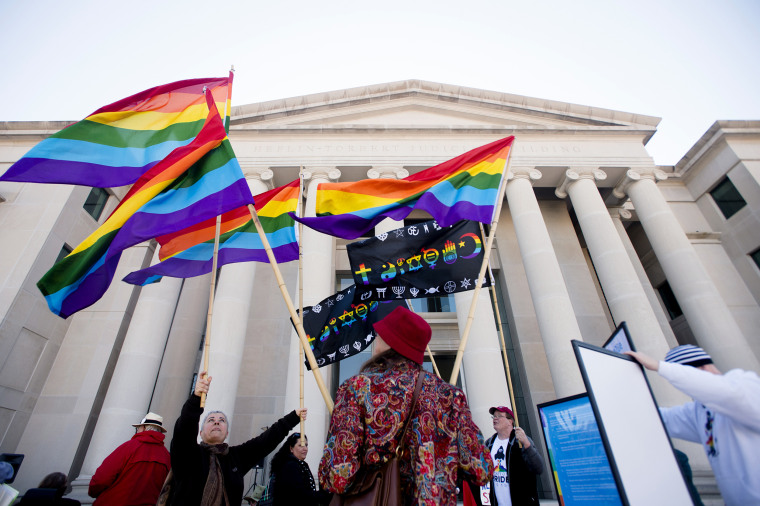Alabama Republican State Sen. Greg Albritton fashions himself a “traditionalist.”
“I’d like to think I’m kind of a religious guy,” he told NBC News. “I believe marriage is a sacrament of God.” Another thing Albritton believes in: following the law.
That's why Albritton said he introduced a bill in Alabama — one of several states that has encountered trouble adopting same-sex marriage following the Supreme Court's 2015 marriage equality ruling — that would get rid of marriage licenses in the state altogether. But the jury is still out on whether his proposed solution is smart policy or a way to shield homophobic judges who refuse to issue these licenses to LGBTQ couples.
Gay marriage in Alabama — and nationally — is the “law of the land,” and Albritton says, as lawmakers, “it’s our duty to find a way to comply with the law.”
But after the Supreme Court issued its landmark Obergefell v. Hodges decision in 2015, which made same-sex marriage legal across the United States, several probate judges in Alabama who issue marriage licenses protested.
Under the law, probate judges “may” issue marriage licenses, but it’s not required.
In 2015, Clarke County Probate Judge Valerie Davis said in a statement that she was suspending the issue of marriage licenses altogether due to same-sex marriage.
"Alabama law does not mandate me to issue marriage licenses to anyone of any gender," Davis said at the time, adding she was not “required to compromise my religious beliefs to be probate judge.”
Davis was joined by a handful of judges, which meant straight and gay couples in those counties were out of luck if they wanted a license. They had to travel to a county where the licenses were still being issued.
Now, Albritton thinks he has a solution. And the state Senate agrees.
Albritton introduced SB 69, which would get rid of marriage licenses altogether. It passed 26-0 in the Senate last week.
“This bill would provide that it shall be the responsibility of the two parties entering into the marriage to record the required documentation with the judge of probate,” the bill reads. However, it specifies that probate judges “would have no authority to reject any recording of a marriage, so long as the affidavits, forms, and data are provided.”
Under SB 69, in lieu of marriage licenses, a couple would get something that looks more like a contract, circumventing the probate judges and absolving them of their current duties to administer the licenses.
If adopted, Alabama would be the first state to forgo licenses, although other states have proposed similar legislation.
Katherine Bland, 53. an Alabama resident who married her wife in Massachusetts in 2010 before it was legal in her home state, knows the current system isn’t working.
“If you want to get married in your hometown, and your probate judge refuses to do so, your tax-paying dollars are going to that,” Bland said. “It’s not just offensive — it's heartbreaking.”
Albritton has introduced the bill multiple times, in part he says because some counties within his district aren’t currently issuing licenses. The bill keeps dying in the House, but this time around he thinks he has the votes.
If passed, Albritton believes the law “would open up all of Alabama to get married throughout the state without interruption or difficulty,” “streamline the process” and, importantly, “separate the church and state functions.”
Some, though, see the law as a capitulation to probate judges who refuse to issue marriage licenses to same-sex couples.
“It seems to be less about good governance and more about protecting homophobia,” Rep. Neil Rafferty, the first gay man elected to the Alabama Legislature, told NBC News.
“Alabama would be the first state to do something like this,” he said, adding he hasn’t been able to speak to Albritton yet, so he doesn’t know for certain the intentions behind the bill.
“I can’t be too sure about the consequences for all Alabamians. I remain concerned about it, and the possible implications, and I will be watching the bill closely,” he said.
Albritton insists his motivation is to “find a means with the least amount of trouble with the greatest possibility of consensus … without making anybody mad.”
“It doesn’t hurt anybody, it doesn’t hurt anything, it doesn't hurt the institution,” he said. “If you want a ceremony, you can have a ceremony, any type of ceremony you choose, but it won’t affect the legality of the marriage.”
Despite being created in the wake of gay marriage legalization, because Albritton’s bill would affect all Alabamians, LGBTQ groups in the state have stayed largely quiet on the issue.
“We haven't taken a position on this bill, and we’ve remained neutral, because it would affect everyone equally,” said Jamie Foster, executive director of Equality Alabama, a statewide organization that works to advance LGBTQ rights.
For this reason, some people actually think the bill might make it easier for LGBTQ Alabamians to get married. Without a judge in the picture, the obstacles might actually be reduced, since couples would just have to fill out a form and return it to the state.
Bland isn’t so sure. “I don't know if it's going to reduce barriers or not,” she said.
Bland has been involved with the Human Rights Campaign Alabama, which also hasn’t taken a stance on the law.
“We decided not to fight this one,” she said. “The mainstream population is going to have to sort out how this gets implemented, it won't just be us figuring it out.”




